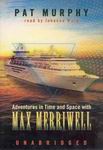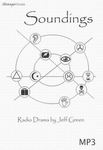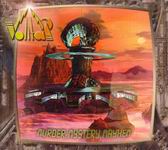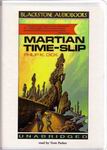
 Adventures in Time and Space with Max Merriwell
Adventures in Time and Space with Max Merriwell
By Pat Murphy; Read by Johanna Ward
7 Cassettes – Approx. 9.5 hours [UNABRIDGED]
Publisher: Blackstone Audio
ISBN: 0783128577
Date Published: 2004
Themes: / Science Fiction / Quantum Physics / Pseudonyms / Multiple Universes / The Nature of Fiction /
In this novel by Pat Murphy, the main character (Susan) and her friend Pat (er… Pat Murphy) take a cruise from New York to Europe. On this cruise is a fiction writer named Max Merriwell who offers a writing class that an uncertain Susan is eager to take. Max Merriwell writes not only under his own name, but also under the pseudonyms Mary Maxwell and Welton Merrimax. Rather quickly, Welton Merrimax starts to appear at various places on the cruise ship, and so does Mary Maxwell, which confuses everyone because, well, they’re supposed to be just pseudonyms. Thus begins an entertaining, wild ride of a novel in which alternate realities intersect and events from Max’s novels start to become real.
I visited Pat Murphy’s website and was pleased to find out that the novel is the third book in a wild experiment. Pat Murphy says, “Adventures in Time and Space with Max Merriwell is an adventure story about the nature of fiction.” This nugget opened up so much more of the novel for me – enough so that I’m eager to listen again. It turns out that Murphy published three novels: There and Back Again by Max Merriwell (which is described as the story of The Hobbit retold as space opera), Wild Angel (which “borrows its premise from Tarzan of the Apes“) by Mary Maxwell, and this novel, Adventures in Time and Space with Max Merriwell by Pat Murphy. All the novels were published as written by Pat Murphy because her publisher felt the confusion would be too great to overcome here in the real world.
Click here for some notes from Pat Murphy (who apparently is real) to unravel the full story.
With all that said, this delightfully quirky novel works stand-alone. I enjoyed it enough to desire the added depth that finding and reading these other two books and re-listening to this one will undoubtedly provide. Listening again will be a pleasure because Johanna Ward performs well, deftly handling the mayhem that must have had her scratching her head a time or two during production. Her voice is pleasant and a very nice match to this material.
Posted by Scott D. Danielson




